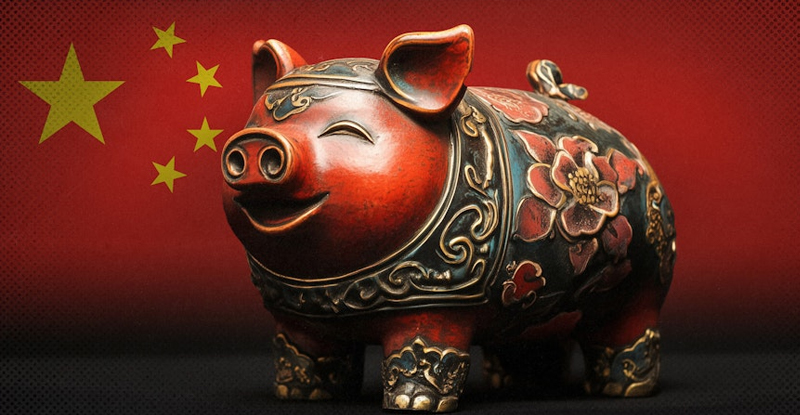By Capt. Brent Ramsey, US Navy ret
STARRS Board of Advisors
China owns a lot of U.S. debt. A Congressional Research Service report from June 2024 shows that China holds $816 billion in U.S. national debt.
Does that sound like a good thing? What rationale possibly explains the benefits of U.S. debt being held by an avowed enemy whose national goal is to rule the world by 2049?
Obviously, when you owe someone money, you are beholden to them. Not only is it a legal obligation to them, but it is a moral obligation, too.
What kind of pressure is created on American leaders, some of whom are quite sympathetic toward China, to have billions and billions of dollars owed? What leverage for China is created by this debt/debtor relationship?
According to the U.S.-China Economic and Security Review Commission, as of March 31, 2022, there were 261 Chinese companies listed on U.S. stock exchanges with a total market capitalization of $1.3 trillion.
How is allowing China to control huge amounts of the U.S. stock market an advantage to us?
China wishes us ill.
How is allowing Chinese companies to influence the U.S. stock market a good idea? Why is it good for China to profit from the U.S. stock market? What manipulation of stocks at strategic times harms U.S. companies and adversely impacts our economy?
Why does the U.S. permit China to own upwards of $68 billion in retirement plans, including U.S. government retirement plans? What impact on the solvency of those earned retirements are at risk? What kind of risk of manipulation is possible to the management of those plans to the detriment of those entitled to the benefits?
If war breaks out between the U.S. and China, what is the impact on these funds? Isn’t there a high degree of risk that China will abandon all its legal obligations related to those assets? A
re all of the various financial assets owned by China and its proxies going to be a bargaining tool that puts the U.S. at a disadvantage during a conflict? Are these investment or ownership arrangements good for America?
Allowing China to own huge amounts of these types of investments presents a risk that China could use these investments as a weapon against us.
Do U.S. leaders understand that China’s motives are not pure and that they do not wish us well?
Why does the U.S. allow American companies to make investments in Chinese companies, many of which are defense-related and all of which are under the complete control of the Chinese Communist Party?
Making Chinese companies stronger makes their competition weaker. Why do we allow them to gain a competitive advantage over us?
Our fiscal policy and law allow speculators to invest in China. This makes them stronger.
The amount invested is even higher over the past decade, as much as $2-$3 trillion more. This supports China’s growing military capabilities. This money has flowed to China with virtually no transparency or oversight.
Let’s look at some myths and truths about investments in China according to an expert in the matter, Brian Burack of the Asian Studies Department of The Heritage Foundation.
He analyzes common myths and truths about U.S. investments in China.
Myth: More U.S. investment in Chinese companies will improve the behavior of the Chinese Communist Party (CCP).
Truth: Seeking to liberalize China through free trade and U.S. capital investments has been tried for decades and has failed miserably, degrading U.S. prosperity and national security in the process. China was supposed to grow freer as it grew richer; instead it has grown more repressive at home and aggressive abroad. The record is clear: Hundreds of billions of dollars of unrestricted American investment in China’s leading companies has neither convinced the CCP to adopt “Western standards” nor “pried open” China’s economy. In fact, under CCP General Secretary Xi Jinping’s increasingly dictatorial rule, that is even less likely to be true today than it was at the turn of the century.
Myth: Limiting investment in China’s military technologies would be “emulating Xi Jinping.”
Truth: It is extremely disingenuous to suggest that America’s monitoring of U.S. capital flows into China—and not funding China’s military-technology programs—is akin to America’s becoming Communist. On the contrary, it is common-sense national security policy. …
Myth: U.S. investment doesn’t help China develop military technologies.
Truth: The United States has the world’s largest capital markets, savviest investors, and most credible financial institutions. There are numerous examples of U.S. capital and expertise aiding the development of CCP military technology. …
Myth: The Treasury Department doesn’t have data to support outbound investment restrictions on China.
Truth: The data are limited because U.S. national security agencies are not currently able to monitor investments in military technology development in China. That is precisely why new authorities are needed and why bipartisan legislative proposals have been advanced to generate such data by requiring notification of certain investments. …
Myth: American investors can outperform Chinese state-owned companies inside China.
Truth: China’s market is rigged in favor of the CCP’s favored companies, especially its state-owned companies, which are only growing more powerful in China’s economy. …
Myth: The CCP will let American investors “control” China’s tech companies.
Truth: The CCP will never allow Americans — or any other foreigner — to exercise meaningful control of China’s domestic technology firms. …
Myth: The CCP doesn’t want Western investment.
Truth: The CCP wants access to American capital, know-how, and technology. Xi is simultaneously extending the CCP’s control of all economic activity in China while also seeking to draw in more foreign investment — in sectors the CCP chooses and on China’s terms.
Mr. Burack’s list goes on for much longer, but you get the idea.
Our policy and strategy toward China are unwise and badly in need of an overhaul.
This is just another example of China’s all-of-party, all-of-government, all-of-nation effort to defeat the U.S. by any and all means.
Wake up, America!








Leave a Comment